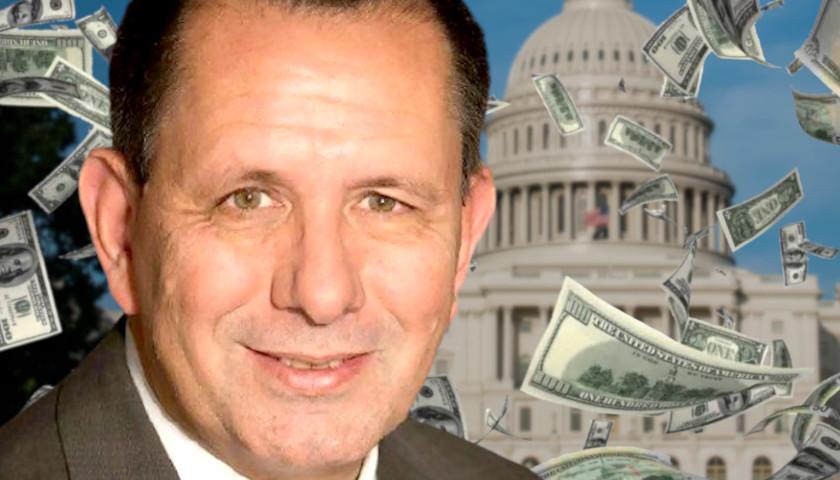Live from Music Row, Wednesday morning on The Tennessee Star Report with Michael Patrick Leahy – broadcast on Nashville’s Talk Radio 98.3 and 1510 WLAC weekdays from 5:00 a.m. to 8:00 a.m. – host Leahy welcomed the original all-star panelist Crom Carmichael to the studio for another edition of Crom’s Crommentary.
CROM CARMICHAEL:
Michael, everybody who’s paying any attention at all has heard the story that Alvin Bragg is about to indict Former President Donald Trump. If anybody’s paying attention, it’s just ridiculous charges. But the ridiculousness of the charges is not the point. It’s the overreach of the prosecutorial state as the general matter because Biden has called for Congress to give the administrative branch more powers to punish bankers for bad judgment, not for crimes, but for simply making, for simply having bad judgment.
Now, who gets to define bad judgment? The administrative state is to define bad judgment. Biden recently, I think yesterday vetoed his first bill, which the bill said that for retirement accounts, those who are in a fiduciary capacity cannot use ESG as a measuring stick and that they have to exercise their fiduciary responsibility and get what they believe to be the best strategy to get the best returns for their customers. Biden vetoed that bill.
Biden wants financial people who have a fiduciary responsibility, he actually wants them to put ESG, therefore the administrative state, ahead of the needs of the actual customer, and the actual retiree. And so what we’re seeing here across the entire spectrum is more and more power going to the state.
Should Alvin Bragg, if he brings these charges, be investigated? Yes, he should. Should he be investigated to determine whether or not there’s collusion between his office or any other office in the state of New York and various bureaus in Washington, D.C., or the DNC or Biden’s campaign?
But there, there needs to be a thorough investigation to determine who else influenced the decision and if he chooses to make that decision. But the bigger theme here is is what is the power of the administrative state.
We recently read, literally in the last couple of days, that UBS, which is a giant bank in Europe, has taken over Credit Suisse and bought the stock for, I think it was in the story I read for $3 billion, which is not much for a bank that’s that big, but that bank has lots of trouble.
What was not well reported was that there were bondholders who held $17 billion of bonds in Credit Suissee, and they were wiped out 100 percent. Normally when you buy a bond you are in a liquidation stack, you are always ahead of the common stockholders because a bond is a debt instrument, a common stock, and has a fixed rate of return and it has a fixed upside.
And because it has a fixed rate of return and a fixed upside, which means you get your principal back, those bonds are senior to the stock. But in this case, the regulators just on their own wiped out the bonds, avoided the contracts that are inherent in the bonds and rewarded the common stockholders instead. This is what we’re seeing now.
I don’t think that was the administrative state here in the United States. I think it was probably the central banks in Europe that approved that deal and pushed it through, and really forced UBS to take over Credit Suisse. And there’s probably behind the scenes a wink, wink, nod, nod.
If it turns out that the losses that Credit Suisse has are greater than the $17 billion of bonds plus the equity that we wiped out in the process also, but not all of it, then we’ll figure out at the back end how to make you whole.
And that’s what is going on now. Those who are big and close to political power, are the ones who are benefiting from the political power, which is not in the interest of the average person. And so it goes. And so we’ll see what Alvin Bragg chooses to do.
I don’t believe Congress, I don’t believe the Republicans will give Biden power to punish bankers for just judgment, especially when you recognize that the regulators are the ones who are supposed to be regulating the banks and regulating their risk.
And so, did Biden ask for authority to punish the regulators? No, he didn’t ask for that because they’re members of the administrative state and they’re members on the power side of the equation.
Listen to today’s show highlights, including this Crommentary:
– – –
Tune in weekdays from 5:00 – 8:00 a.m. to The Tennessee Star Report with Michael Patrick Leahy on Talk Radio 98.3 FM WLAC 1510. Listen online at iHeart Radio.




